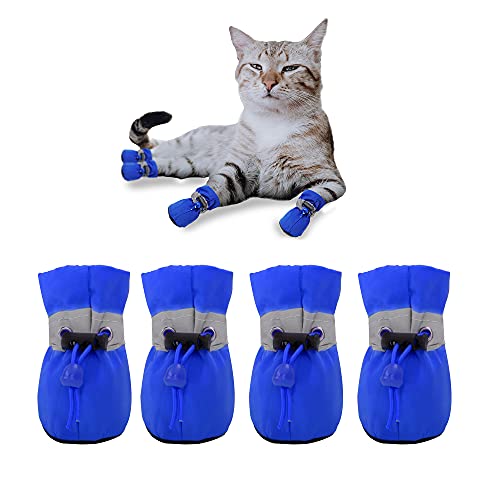It started when she was just a tiny kitten. Indiana didn’t want to sleep in her kitty bed on the floor, so she dug her tiny claws into the mattress and climbed her way to the top of the bed, where she could snuggle in my neck. But it didn’t stop there. What started as a means of being close to me at night became a ritual of scratching on my mattress every night when I tried to fall asleep.
Indiana wasn’t trying to be naughty. She was just enjoying her own little bedtime ritual. But this behavior was both ruining my mattress and keeping me awake at night, so I needed to find some easy fixes to keep us both happy.
If your cat is scratching on your mattress at night, there are several steps you can take to put an end to the destructive behavior. You can give your cat an appropriate scratching toy, remove any temptations, and take care of its claws.
This article will talk about different methods you can use to stop your cat from scratching your bed at night. But first, let’s take a quick look at why cats scratch so you understand where the behavior is coming from.
Why Do Cats Scratch?
Cats scratch for a variety of reasons. They scratch to remove the outer sheath of their claws and sharpen them. Sometimes they scratch to mark their territory. Sometimes they scratch when they are stretching. And sometimes they’re just bored!
Since cats are natural predators, they also tend to hunt at night. So if a cat scratches at night, she isn’t trying to be naughty. She’s probably just being a cat!
Don’t worry. There are a few things you can try to stop your cat from scratching on your bed at night so you can get your well-deserved rest.
Why Not Just Declaw Your Cat?
Declawing might seem like a good idea, but it isn’t pleasant for the cat. Declawing actually involves amputating the first joint of the cat’s toes. In addition, declawing can cause a variety of problems, such as surgical complications, difficulty walking, and emotional stress on the cat. Since it’s a cat’s natural instinct to scratch, it is just better for them to find ways to direct your cat to scratch appropriately. You can find more information on the dangers of declawing your cat here.
If your cat is scratching your bed at night, try some of these ideas to stop the unwanted behaviors. Remember, time and patience are crucial to finding the right solution for you and your cat.
What to Do If Your Cat Scratches Your Bed at Night
1. Find out what kind of scratching toys your cat likes best.
Like people, cats have their own personalities and their own preferences. The same goes for their scratching posts. Your kitty might be scratching on your bed because she just loves that feeling or even because she just loves you.
You might want to buy or borrow a variety of different scratching posts and toys and see which one your kitty likes the best. They may like wood, carpet, cardboard, sisal, or some other texture even better than your mattress! Some cats like to scratch on a vertical surface, while others prefer horizontal or even a combination. Regardless, you’ll probably need something long enough for your cat to stretch out on while scratching completely.
Get her a scratching post that she finds irresistible, and the problem will probably resolve itself. Our kitty liked a giant cat climber with lots of shelves, holes, and a variety of textures. She could climb, scratch, stretch and explore for hours on end, and she ended up leaving the bed alone.
2. Make her scratching post irresistible.
Your kitty might be scratching on your bed because her own scratching post just isn’t that interesting. And since you are on your bed, that makes for a lot of excitement when she scratches on it! But, on the other hand, she might just love the game when she wakes you up with her scratching, and you chase her off the bed.
Make your cat’s scratching post much more attractive to her. Add some toys, catnip, and treats to her scratching post so that it attracts your cat’s attention. Then, if she’s busy scratching on appropriate items, she won’t be bothering your bed or you.
3. Give your cat extra playtime and attention during the day.
For example, if your cat is scratching on your bed because they are bored and seeking attention, you might need to give your kitty a little one on one playtime during the day.
Bored cats can easily become destructive cats, so keep her entertained – and wear her out – with a fun play session in the evening.
You might try a laser pointer, wand toy, or even teaching your pet tricks such as how to fetch, roll over, and jump on command. A little bit of attention and some healthy treats might go a long way towards getting you some extra sleep at night.
4. Leave interesting toys and snacks around your cat’s play area at night.
Entice your kitten away from your bedroom at night by giving her a designated play area full of things she just loves. Create a cozy space with a kitty bed or hideout, a scratching post, exciting toys, and treats. You might look for toys that light up, bounce, sway, or vibrate when your cat interacts with them. This way, she can get her energy out without bugging you.
5. Lock your pet out of your bedroom.
If nothing else works, don’t be afraid to simply shut the door to your room. It might take a little bit of discipline on your part to keep the door closed, but it will spare you a lot of nighttime frustration. Bonus, you won’t need to replace your mattress, either.
6. Discourage your pet from scratching on undesirable items.
Sometimes, scratching has just become a nasty, habit and you need to remind the kitty that your mattress is not a good thing to scratch on.
You can do this by covering the mattress with plastic (when you’re not in it, of course), applying double-sided sticky tape to the ends where scratching occurs, or by taping sandpaper to the area temporarily until your kitty learns a more acceptable place to scratch. You won’t need to do this forever, just until your pet learns new and more appropriate behaviors. You can purchase pet-specific double-sided tape if you prefer, but carpet tape also works well. Some people find cats don’t like the feel of aluminum foil, which you could also tape over the scratched area.
7. Place appropriate and preferred scratching toys next to what you don’t want your kitty to scratch on.
For example, if kitty scratches at the end of your bed, try placing their favorite scratching post next to the spot. Next, put some double-sided sticky tape or aluminum foil over the spot where your cat is scratching. Then, when she finds her favorite scratching spot has been ‘foiled,’ she might just turn to the intended scratching post instead.
8. Trim your kitty’s nails.
One way to reduce scratching is to keep your cat’s nails short enough that they can’t do damage. The ASPCA gives you directions on how to clip your cat’s claws here. Or, watch this vet video here.
If you are clipping your cat’s claws for the first time, you’ll want to go slow. It is ok if you only cut one or two nails the first time – it’s a learning process for you both. Be very gentle and offer plenty of treats and praise, too.
9. Try using claw protectors.
You can find them here. Claw protectors are applied to your kitty’s claws and will last for about 4 to 6 weeks. Bonus, they come in all colors to suit you or your kitty’s personality!
10. Cat booties.
If the claw protectors aren’t enough to keep your kitty from scratching, you might want to try cat booties. These little shoes fit over your cat’s feet, which will keep them from clawing on your mattress. However, it probably won’t be your cat’s favorite accessory, but it might stop the problem.
11. Pet Repellent.
Four Paws Keep Off! is a pet repellant spray that will help remind your cat to stay off of your mattress. However, it isn’t a perfect solution and might stain, so you’ll need to test a small area first. Also, as the website states, this product is best used in conjunction with training, so you’ll want to provide plenty of appropriate places to scratch if you use it. You can see the pet spray here.
12. Startle your kitty.
If you catch Whiskers in the act, you can startle him to stop the bad behavior. Never hit an animal! But if needed, you can clap your hands, firmly tell your pet “no,” or squirt them with water.


